- Home
- Mack Reynolds
Equality: In the Year 2000 jw-2 Page 4
Equality: In the Year 2000 jw-2 Read online
Page 4
Edith put in hurriedly, “I am afraid the conversation is upsetting you, Jule. Father wants you to avoid emotional disturbances at this stage of your recovery.”
“It’s all right,” Julian said, looking at Sean. “What did you want to know?”
“You can still do such things as fire a machine gun accurately, throw a grenade, fight with a bayonet…?”
“In Vietnam there was precious little bayonet fighting. Possibly in the First World War, in the trenches, but by Vietnam the bayonet was more or less antiquated. Grenades? There’s not much to know about grenades. You pull the pin and heave, or, if you need more distance, you attach a grenade launcher to the end of your rifle. A machine gun? Yes, I could field strip a machine gun in complete darkness, or a .45 automatic, for that matter. Could I still fire one accurately? Yes. I was an averagely good marksman.”
“What rank did you hold… Julian?”
“I was discharged a major.”
The other was leaning forward. “Excuse me, but… well, did you ever kill anyone?”
Julian took a breath. “Yes.”
“How many?”
He shook his head. “I don’t know. I haven’t the vaguest idea. You see, in modern warfare—I suppose I should say in the Vietnam War, rather than use the term ‘modern’—combat doesn’t much resemble the war films you have possibly scanned from the data banks. Hollywood didn’t make movies that portrayed reality; they would be too boring. In the movies, the action is eyeball to eyeball, with the bad guys—the Germans, Japs, Koreans, Viet Cong, or whoever—falling like flies before the good guys who are armed with submachine guns that never run out of ammo and never heat up, no matter how many hundreds of rounds go through the barrels in a few minutes. In actuality, you see comparatively little of the enemy, although there are some exceptions. Fire power is all the thing. You fire in the general direction of where his fire is coming from. You put as much lead and steel into the air as you can, hoping that Charlie will run into it. You saturate the area he is in with bullets, with mortar shells, with artillery shells, with bombs from your air cover. And then, when all is quiet and Charlie is either dead or, more likely, has largely slipped away, you go forward and get a body count.”
“A body count?” Edith said. In spite of herself, her face was registering that she was upset.
Julian looked at her. “Yes. It was a return to the barbarism of Indian warfare days. To prove how many of the enemy we had killed, we cut off their ears and took them back to base headquarters.”
“Proof of the number you had destroyed, eh?” Sean asked, fascinated.
Julian took another quick breath. “Yes. But the thing is, the Colonel, and the General above him, liked to have an impressive body count, so we customarily also cut the ears off any women, children, or old men that had managed to get in the line of fire or bombing.”
“But those were civilians,” Edith said in horror.
“Right,” Julian agreed, his tone sour. “But we couldn’t allow that to interfere with a good body count.” He scowled at Sean. “Did you labor under the illusion that combat was glamorous?”
The other didn’t respond. Instead he asked, “Were you ever afraid when you were fighting?”
“I was always afraid when I was fighting,” Julian said flatly. “Anybody in combat who doesn’t get afraid—the hero type, in short—isn’t the kind of man you want next to you. He’s one of the crazies and is apt to get you in trouble.”
That set the student of history back a bit. He asked his next question more hesitantly, “Did you ever do anything that resulted in your being decorated, getting a medal?”
Julian grunted. “I was awarded the Distinguished Service Cross, also several battle stars and three Purple Hearts.” A muscle jumped in his jaw and he looked into Edith’s face almost apologetically. “I didn’t ask for them. After two or three weeks in the rice paddies and the jungles, I did not ask for those things. But it was meaningless to refuse them—particularly the Purple Hearts.”
“Purple Hearts?” she echoed.
“Yes. You received one for being wounded.”
Her eyes rounded.
He shrugged it off. “Routine stuff. Once I was hit by a piece of mortar shell while sitting in a foxhole minding my own business. Once I stepped on a homemade Viet Cong mine. It didn’t go off very efficiently or I wouldn’t be here. The other time I was hit by an M-16 rifle slug from one of my own men. It was an accident… I think. Toward the end of the war, quite a few officers took hits from their men, if they seemed to be too gung ho. Not that I was.”
“Gung ho?” Sean said. He had been taking notes in a small black notebook with a stylo.
“Anxious to win the war,” Julian explained dryly. “Officers who would try to get their men into situations the men didn’t like the looks of.”
“But I thought you had to obey an officer’s orders.”
“Yes, that was the theory. But it wasn’t a very popular war and the men wanted to live long enough to go home. Nobody seemed to know why we were fighting except the politicians back in Washington. Toward the end, morale was so bad among the infantry that it was impossible to remain in Vietnam, which was one of the real reasons we pulled out, rather than the propaganda reasons the people were given.” He stopped. “Why are you taking notes, Sean?”
The younger man flushed. “When I was turned down as a teacher, I decided that one way to be active in the work I like is to become a journalist. I plan to do as many articles as I can on developments in the fields I know and submit them to the news. If enough readers dial my articles, I may be able to become a full-time journalist. I’d rather teach, but since my Aptitude Quotient wasn’t high enough, journalism might be the next best thing.”
“I wish you luck, Sean,” Edith said. She took her transceiver from her pocket and touched the stud for the time. “My goodness, sirs,” she exclaimed. “I’ll have to run. I have an appointment.” She rose with a degree of grace that didn’t go unnoticed.
Julian had also started to stand, but she grimaced at him playfully. “None of that male chauvinism courtesy,” she said. “I don’t stand for you, why should you for me?”
“I was going to see you out.”
“Why? I can find my own way to the door and you’re still talking to Sean.”
“As you wish,” he said in resignation. “I’ll see you later, Edie.”
“Fine. Is there anything you need that we haven’t checked you out on as yet?”
“I can’t think of anything.”
She looked about the room. “This place is on the grim side. Why don’t you dial Art, in the data banks, and select some paintings?”
“I was going to ask you about that. Can I afford them?”
“The price is minimal.”
He said unhappily, “I imagine modern art is pretty far out. Frankly, my tastes never developed beyond the Impressionists.”
Edith practically snorted. “With some twenty million painters in the country, every school that ever existed, from the Cro-Magnon cave painters to the present, is represented. You’ll find all the Impressionists you want in the painting banks.”
“Twenty million painters?” he repeated blankly.
Both Sean and Edith laughed.
Edith said, “I don’t really know the exact number. I told you that just about everyone in United America has at least one art or handicraft as a hobby, beyond whatever type of work he specializes in. Well, until later… Good-bye, Sean.”
The young man waved farewell to her, and she turned and left.
Julian looked back at Sean. “Anything more you want to know about blood and guts?”
“Not at the moment.” The other put away his notebook and stylo. “But I’d appreciate the opportunity to talk with you more when I’ve digested what you’ve told me and thought up some more questions.”
“Anytime. I’ll probably have a few to ask you, as well. I seem to have done most of the talking today.”
Sean hesi
tated for a moment. “You know, I have some friends who would love to meet you too. Do you think you could sneak away from Doctor Leete and his family some evening?”
“Sneak away?”
Sean laughed, in some embarrassment. He said, “Leete’s been given the job of adjusting you to your new environment, and it’s well known that he’s keeping you on a tight rein. It frustrates some of the rest of us who would love to have the chance to talk with a man who has actually been in combat—just a few months ago, in his mind—who has witnessed riots in the streets of the nineteen-sixties, who remembers clearly the days of street crime, juvenile delinquency, and all the rest of it.”
Julian smiled. “I didn’t think of the good doctor as my jailer, but I suppose in a way he is. How could we get together?”
“Why don’t we meet down on the ground level in the Cub Bar?”
“Cub Bar?”
“I suppose thus far the Leetes haven’t taken you out to any of the public places of entertainment. It’s a pleasant, intimate little bar, one of several dozen in this building. Could you meet me there, say, tonight at eight?”
“Certainly,” Julian said, standing as the other did. “I’d like to see the present-day equivalent of a bar. And I’m anxious to meet more of the present generation. Will they speak English too? My Interlingua isn’t all that good.”
“They’ll speak English.”
Julian saw him to the door. After Sean was gone, he thought of one question he could have asked. How did one go about getting a girl to sleep with him in this day and age?
Chapter Four
The Year 2, New Calendar
Despite the perils and problems of our times, we should be glad that we are living in this age. Every civilization is like a surf rider, carried forward on the crest of a wave. The wave bearing us has scarcely started its run; those who thought it was already slackening spoke centuries too soon. We are poised now, in the precarious but exhilarating balance that is the essence of real living, the antithesis of mere existence. Behind us lie the reefs we have already passed; beneath us the great wave, as yet barely flecked with foam, humps its back from the sea… And ahead…? We cannot tell; we are too far out to see the unknown land. It is enough to ride the wave.
—Arthur C. Clarke, Profiles of the Future
When he was once again alone, Julian moved about the apartment, checking it out in more detail. So far as he could see, there was no reason in the world why he couldn’t be comfortable here. It was smaller than the apartment he had maintained in the United Nations Plaza building in New York, or even the Paris place on the Left Bank, but he wasn’t going to need servants here; Edith had explained that the apartments were entirely automated. He was going to have to check that one out. How the hell could you automate sweeping, dusting, washing windows; above all, how could you automate making a bed? Not that he couldn’t make his own bed, of course.
It was too early in the day, but he decided he could use a drink. He went back into the living room, to the small auto-bar which stood in one corner. He stared down at it. Although he had been in the Leete home for some time now, he had never used the auto-bar in their apartment; someone else had always gotten the drinks.
Well, it couldn’t be too complicated. There was a numbered dial and also a button, below a speaker. Experimentally, he pressed the button. He hadn’t the vaguest idea how to dial. Probably, somewhere around here, there was a pamphlet listing drinks, and all you had to do was dial what you wanted.
Instead, he cleared his throat and said, “I’d like a martini, with a twist of lemon peel rather than an olive.”
A slightly mechanical voice answered, “We are sorry, Mr. West, but that beverage is not on our list.”
He was genuinely surprised. “A martini not on your list?”
“No, Mr. West. However, if you will give us the formula it shall be placed in the building’s data banks.”
“All right. You take four, no make that five parts of gin and put it in a shaker with one part dry vermouth and lots of ice. You stir it briskly until it is very cold, but not too long so that too much of the ice melts. You pour it into a pre-chilled, thin-shelled cocktail glass and then twist a peel of lemon over it and drop the peel into the drink.”
“Thank you, Mr. West. The formula is now on file.”
He stood back half a step and scowled at the auto-bar. Now what?
It couldn’t have been two minutes before the top of the bar sank down to rise up again with a highly chilled, champagne-size glass. He was somewhat taken aback. He should have told them just what he meant by a part; that is, about a third of an ounce. There were at least five ounces of gin in this oversized, so-called cocktail glass. Well, he could straighten that out with them later. He took the drink and went over to the easy chair that was placed before the room’s TV screen.
He got out the screen’s directory and looked up the General News. Then he dialed it.
If he understood correctly, General News was the equivalent of the front page in the papers of his own day. Front page and possibly second and third.
The material began flashing before him, but it was Interlingua, and he was incapable of understanding more than one word out of three. He dialed for Information and asked it he could have the General News in English.
No problem, except that he couldn’t follow it even in English. It was too technical, except for a few items on entertainment and social matters. In disgust, he dialed again and, with a slight rasp in his voice, asked for the news in English for younger people—between the ages of eight and ten.
The voice said, “Of course, Mr. West.”
“What do you mean, of course?’” he snarled.
“Yes, sir,” the voice said unemotionally, as always.
How the hell did you argue with a computer? He settled back in the chair and took an irritated pull at his martini. Even the computers in this building knew that he had the educational level of a ten-year-old—maybe less.
For he found his work cut out for him trying to follow along even on that level.
The news was considerably different than it had been a third of a century ago. For one, there was no crime news. He was to find out later that this came under the heading of Medical News, and there was precious little of it. There was no financial news, either, which was one of the first items he used to look up in the Times and the Wall Street Journal.
There was a good deal of scientific and technological news, practically all of it entirely beyond him.
“Good God, this is for eight-year-olds?” he muttered, pulling at his overgrown martini again.
There was a great deal of sports; but there had been changes. There was no longer such a thing as boxing, although there was wrestling, and no karate or judo. There was seemingly no bullfighting, or auto racing, or any other sport that might involve someone getting hurt. There wasn’t even football. The remnants of the Roman arena had disappeared from the sports scene, and viewers of spectacle sports evidently no longer got their kicks from the fact that they might witness a serious injury, or even death. Nobody got hurt in the sports of this era.
There was a great deal of entertainment news. Some of it was on a new order for him. For instance, it would seem that one of the current entertainment fads involved composing poems—on your feet. That is, a contestant would be given, cold, a subject, and within only a few minutes, he was expected to deliver his poem. The judges would give him both the subject and a verse form—a sonnet, or more intricate French form such as a rondeau—and he would have to compose in that form and on that subject. There was no possible manner in which he could prepare himself beforehand. In such a contest, Julian decided, he would have considered that he’d done well if he were able to come up with anything: Cold Beer Sold Here.
It would seem that in this age, intellectual exercises were all the thing. He wondered if they still played charades. Back in the fifties, he had rather prided himself on his own abilities. If the game had become extinct, he would re
introduce charades.
He gave up on the General News and tried, in the way of an experiment, Music. In his day he had been exposed to classical music beyond the point of desire, but it was a social must. These people now seemed to live for it. A musical great was the equivalent in status of a billionaire in his own time.
Ballet followed Music. There seemed to be a ballet revival that would have given Nijinsky and Pavlova back seats. He had always liked ballet. He wondered if they ever did the old classics, such as Swan Lake.
But Scientific News was half of all news, and he was lost. Even in English on the ten-year-old level, he hadn’t the vaguest idea of what he was reading. He abruptly flicked off the set, picked up his glass and finished off his martini. He slumped back in this chair, thoroughly frustrated. He didn’t know enough in this day even to know where to begin.
He flicked the screen back on, for something had occurred to him.
He dialed information and said, “I want a resumé, in English, on an eight- to ten-year level, on the outstanding scientific breakthroughs that have taken place since the year 1970 Old Calendar.”
“Yes, Mr. West. That will take two or three minutes to compile. Did you wish an extensive report or a brief?”
He suspected that an extensive report would take him the better part of the rest of the week to wade through. “Just a brief.”
Two or three minutes. It was the first time the Internationa] Data Banks hadn’t come back with something he wanted immediately. Probably it was the first time the request had ever been made. He shrugged and settled back in his chair.
While he waited, he thought back over his conversation with Edith and Sean O’Callahan. He hadn’t really told them anything about combat. Not really. It wasn’t something easy to tell about; you almost had to witness it to understand. Oh, some of the really good writers had been able to tell it true. Wasn’t that the way Hemingway had said it, tell it true ? Something like that. But the Old Man had been there, and more than once. Papa Hemingway had been one of the few men Julian West had ever met who actually seemed to like war.

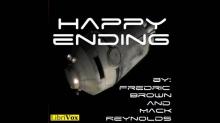 Happy Ending
Happy Ending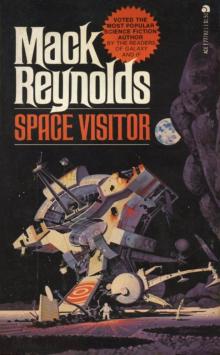 Space Visitor
Space Visitor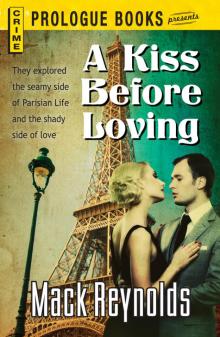 A Kiss Before Loving
A Kiss Before Loving Episode on the Riviera
Episode on the Riviera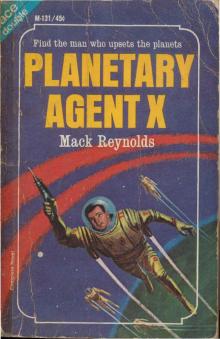 Planetary Agent X
Planetary Agent X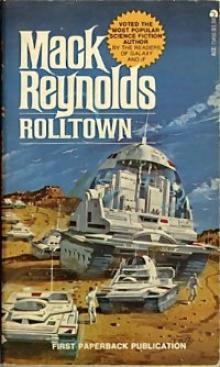 Rolltown bh-3
Rolltown bh-3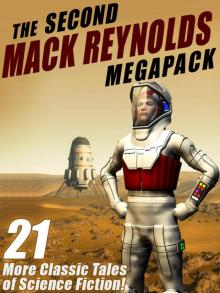 The Second Mack Reynolds Megapack
The Second Mack Reynolds Megapack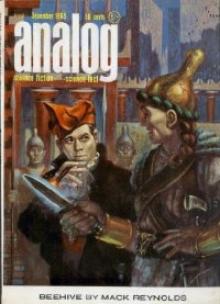 Dawnman Planet up-2
Dawnman Planet up-2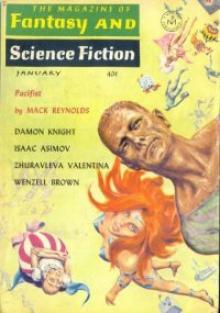 Pacifist
Pacifist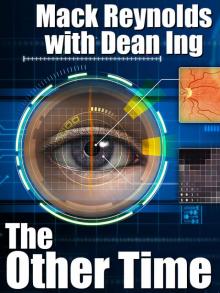 The Other Time
The Other Time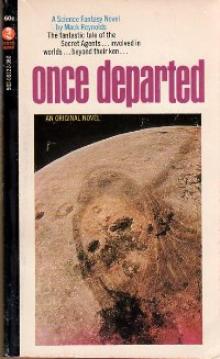 Once Departed
Once Departed IQ
IQ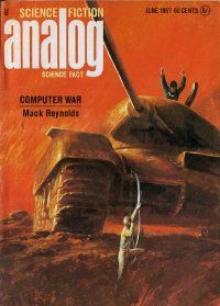 Computer War
Computer War Earth Unaware
Earth Unaware The Rival Rigelians up-3
The Rival Rigelians up-3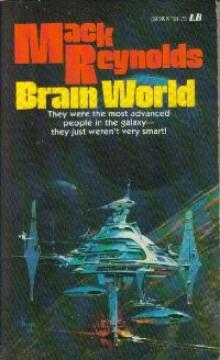 Brain World up-7
Brain World up-7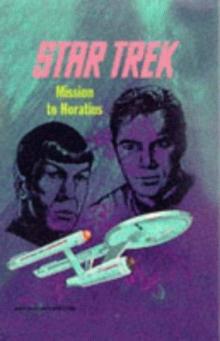 Star Trek - TOS - Mission to Horatius
Star Trek - TOS - Mission to Horatius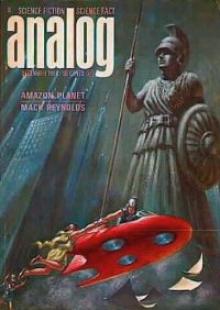 Amazon Planet up-5
Amazon Planet up-5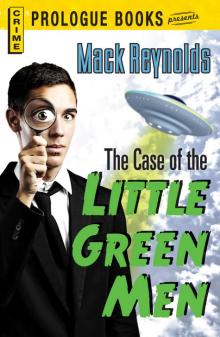 The Case of the Little Green Men
The Case of the Little Green Men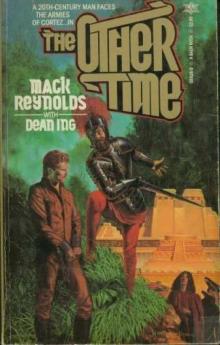 Other Time
Other Time The Mack Reynolds Megapack
The Mack Reynolds Megapack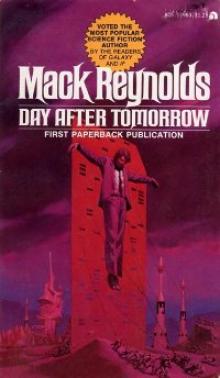 Day After Tomorrow
Day After Tomorrow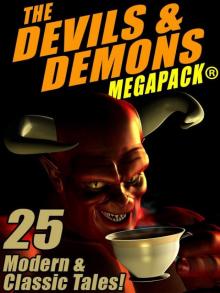 The Devils & Demons MEGAPACK ®: 25 Modern and Classic Tales
The Devils & Demons MEGAPACK ®: 25 Modern and Classic Tales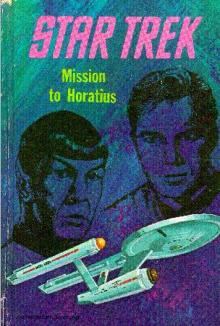 Mission to Horatius
Mission to Horatius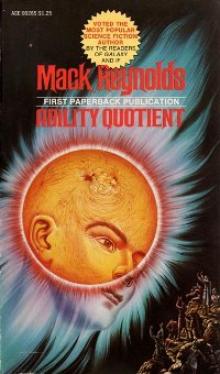 Ability Quotient
Ability Quotient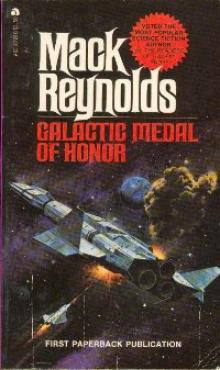 Galactic Medal of Honor
Galactic Medal of Honor Trojan Orbit
Trojan Orbit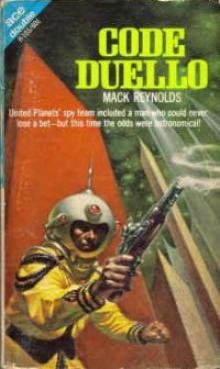 Code Duello up-4
Code Duello up-4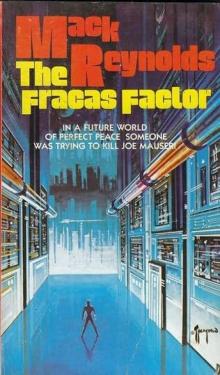 The Fracas Factor
The Fracas Factor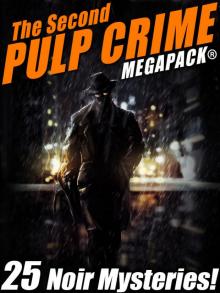 The Second Pulp Crime
The Second Pulp Crime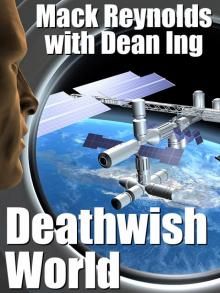 Deathwish World
Deathwish World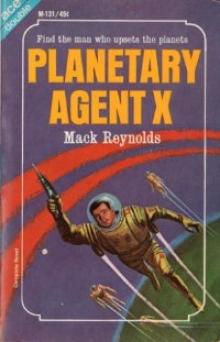 Planetary Agent X up-1
Planetary Agent X up-1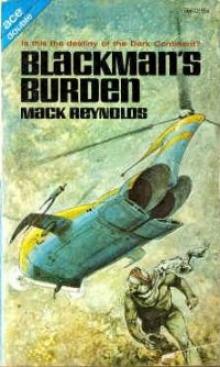 Blackman' Burden na-1
Blackman' Burden na-1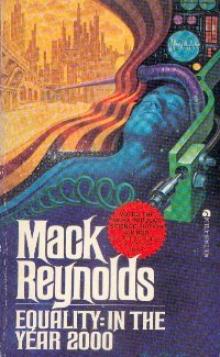 Equality: In the Year 2000 jw-2
Equality: In the Year 2000 jw-2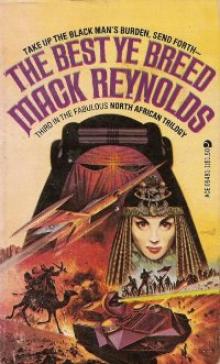 The Best Ye Breed na-3
The Best Ye Breed na-3 The Jet Set
The Jet Set The Rival Rigelians
The Rival Rigelians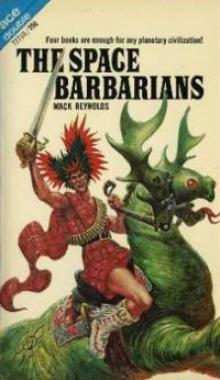 The Space Barbarians
The Space Barbarians